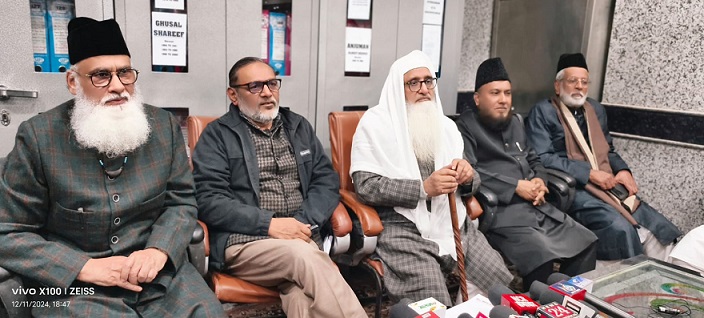Last Updated on December 13, 2024 12:04 am by INDIAN AWAAZ

Supreme Court should take a clear and positive stand on the Worship Act as soon as possible so that the rule of law can be restored in the country and efforts to create chaos and unrest can be stopped.
AMN / New Delhi
The All India Muslim Personal Law Board, AIMPLB has welcomed the Supreme Court’s interim ruling on the Places of Worship Act in which Survey of Muslim places of worship suspended until further order..
All India Muslim Personal Law Board spokesperson Dr. Syed Qasim Rasool Ilyas in a statement welcomed the interim decision of the court and said that despite the presence of this act, the local courts have declared appeals against mosques and dargahs to be admissible one after the other.

The kind of orders passed by courts had made the entire law meaningless. The Supreme Court has not only stayed any effective and final decision in this case till the next date, but has also banned the order of survey. The Supreme Court made it clear that no new case should be registered until the Supreme Court takes a clear decision on it.
The court made it clear that the pre-settled principle ie the Civil Court cannot pass judgments parallel to the Supreme Court. Hence the need for a stay is felt while the decision of the five member bench is already there. The act was challenged in 2020 to which the court asked the central government to file its reply.
Once again the Supreme Court has asked the central government to file its reply which will be put on the website for anyone to read. Apart from the All India Muslim Personal Law Board, many other people are involved in this case.
It is expected that this order will stop the actions of miscreants against mosques and dargahs across the country. However, the Supreme Court should take a clear and positive stand on the Worship Act as soon as possible so that the rule of law can be restored in the country and efforts to create chaos and unrest can be stopped.
Delegation of All India Muslim Personal Law Board in Ajmer Sharif
Meanwhile a delegation of the All India Muslim Personal Law Board rejected the claim of a temple at the Ajmer dargah and said that the courts should not have accepted such baseless and false claims. In the presence of the law related to, “Places of Worship Act 1991”, if the courts continue to accept such claims and pass orders for survey etc. on them, it is feared that this will lead to lawlessness and anarchy in the country.
Delegation of the All India Muslim Personal Law Board was led by the General Secretary of the Board, Maulana Shah Muhammad Fazl-ur-Rahim Mujadadi, including Dr. Syed Qasim Rasool Ilyas, Spokesperson of the All India Muslim Personal Law Board, Maulana Abu Talib Rahmani, Member of the Board, and Mr. Nazim. Uddin Sahib, Ameer Halqa, Jamaat-e-Islami, Rajasthan was a participant, visited Hazrat Khwaja Moinuddin Chishti Dargah, Ajmer and met the Dargah Committee and Sajjadgan and expressed its resentment over the case against the Dargah. The delegation assured the Dargah representative that the Board is not only morally with them but will support them in all kinds of legal, political and constitutional battles.
Later in a press conference with Sajjadgan, the board categorically stated that the All India Muslim Personal Law Board totally rejects the baseless claim on the historical shrine of Ajmer, it is deeply surprised and concerned that the historical evidence and Despite the presence of legal documents and the Places of Worship Act 1991, how can the local court of Ajmer accept it and issue a notice on it. The All India Muslim Personal Law Board expresses its deep dismay and concern that a new series of claims against mosques and dargahs has started in various courts of the country. The matter of Sambhal’s Jama Masjid was not yet over when the world famous Ajmer dargah was claimed to be Sankat Mochan Mahadev Mandir. The complainant has made the Dargah Committee, the Union Ministry of Minority Affairs and the Central Archeology Department as respondents. In the presence of the Places of Worship Act 1991, such claims are a mockery of the law and the Constitution. While introducing the law in Parliament, it was made clear that the status of a place of worship (mosque, temple, gurudwara, bodh vihar, church etc.) as on 15th August 1947 would remain and could not be challenged.
In fact, its purpose was very clear that after Babri Masjid, no other mosque or places of worship of other religions could be targeted or surveyed. However, it is a matter of great regret and shame that the Gyan Vapi Masjid, Varanasi, Mathura’s Shahi Eidgah, Bozh Shala Masjid, (Madhya Par Desh), Lucknow Mound Mosque, Sambhal’s Jamia Masjid and Jaunpur Mosque along with the historic Ajmer The shrine was also claimed. Further, in view of this law, the court not only allowed petitioner Vishnu Gupta’s application for hearing but also issued notice to the parties. Hindus claimed that there was a temple of Lord Shiva on the grounds of the dargah, where worship and fire abhishek was performed.
